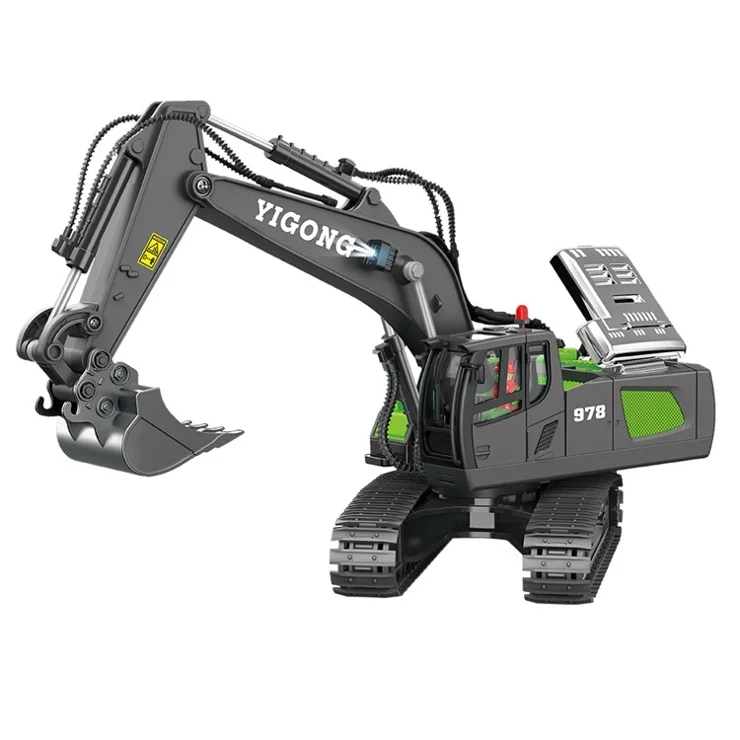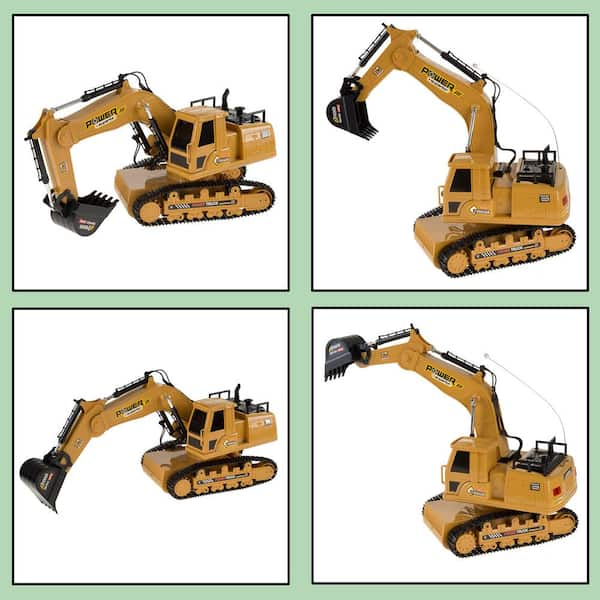Recognizing Exactly How Excavator Works and Its Influence On Effectiveness
Excavators play a necessary function in building and mining operations, depending on a complicated interaction of hydraulic and mechanical systems. Their capability to carry out a variety of tasks pivots on both their design and the technology integrated within. Comprehending these components can substantially affect operational performance and performance. As innovations proceed to reshape the market, one should consider exactly how these adjustments will affect future methods and efficiency.
The Fundamentals of Excavator Mechanics

The Role of Hydraulic Systems in Excavators
At the heart of excavator operation lies the hydraulic system, which plays a critical function in powering the maker's functions and motions. This system uses pressurized hydraulic fluid to move power, enabling numerous actions such as excavating, moving, and training. By taking advantage of the concepts of hydraulics, excavators can execute jobs with remarkable precision and force, enhancing general operational efficiency.The hydraulic system contains crucial elements, consisting of cylinders, pumps, and valves, which interact to control the flow and direction of the liquid. When the operator engages the controls, the hydraulic liquid is guided to particular cylinders, converting the driver's commands into physical motion. This mechanism enables smooth and receptive activities, which are crucial in building and construction and excavation atmospheres. double e volvo rc excavator. The performance of the hydraulic system straight affects the productivity and versatility of the excavator, making it a vital aspect in modern excavation procedures
Secret Elements of an Excavator
Comprehending the key parts of an excavator is important for grasping exactly how this powerful machine runs. An excavator includes several considerable aspects, consisting of the undercarriage, home, arm, boom, and pail. The undercarriage provides stability and flexibility, typically including tracks or wheels to navigate different surfaces. Your house has the engine and hydraulic systems, enabling the driver to control movement and power the maker. The boom extends from the residence, enabling upright reach, while the arm attaches to the pail, helping with excavating and training operations.Additionally, the taxicab houses the operator, geared up with controls for exact handling. Each of these elements plays an important role in the excavator's overall functionality, adding to its performance and efficiency on building and construction sites. Comprehending these components aids in enhancing and preserving excavator efficiency, ensuring tasks are finished securely and effectively.
Accessory Convenience and Its Benefits
Attachment adaptability is an important element of excavators, making it possible for drivers to switch over between various tools tailored for certain jobs. This flexibility not only improves task effectiveness yet additionally adds to cost-effectiveness by reducing the need for multiple makers. Recognizing the different types of attachments available can significantly influence the overall efficiency and capability of an excavator on work websites.
Types of Add-ons
While excavators are primarily identified for their digging capabilities, their real adaptability depends on the vast variety of accessories offered. These attachments boost the excavator's performance, enabling it to perform numerous jobs beyond excavation. Common attachments consist of containers (for digging and scooping), hydraulic thumbs (for realizing materials), and augers (for drilling openings) Grapples are made use of for managing and moving particles, while rippers can separate hard surface areas. Various other specialized add-ons, such as trenchers and plows, make it possible for excavators to adjust to certain work demands. This diversity not only boosts the machine's energy across different fields, including landscape design, building, and demolition, however additionally enables operators to customize their equipment to meet certain task demands successfully.
Enhanced Work Efficiency
Maximizing task effectiveness is a main benefit of making use of different excavator accessories. Various accessories permit an excavator to carry out several jobs without requiring to switch over equipment, conserving valuable time and labor. For example, making use of a hydraulic hammer can break concrete while a container attachment can dig deep into dirt, allowing a smooth operations. This flexibility minimizes downtime connected with tools changes and enhances efficiency on-site. In addition, specialized add-ons enhance accuracy in tasks such as grading or landscaping, resulting in better results. The capability to adjust to various work needs not just simplifies procedures yet also lessens the demand for added machinery, guaranteeing that jobs are finished promptly and properly. Overall, attachment adaptability significantly contributes to raised work efficiency in excavation work.
Cost-Effectiveness and Adaptability
Cost-effectiveness is a considerable advantage of utilizing flexible excavator accessories. These attachments permit a single excavator to execute several jobs, minimizing the requirement for additional equipment and labor - double e volvo rc excavator. By changing between pails, hammers, and grapples, drivers can tackle numerous tasks, from excavating to demolition, thus taking full advantage of devices usage. This versatility not just lowers functional expenses but additionally reduces downtime connected with altering tools. Furthermore, the ability to tailor excavators with specialized attachments boosts productivity, as they can effectively handle diverse jobs according to project demands. To end, the combination of cost-effectiveness and versatility in excavator add-ons adds to enhanced functional effectiveness and source allowance in building and construction and excavation projects

Advanced Innovation in Modern Excavators
Modern excavators are increasingly equipped with innovative innovation that transforms excavation processes. Automation simplifies procedures, while enhanced gas effectiveness reduces functional costs. In addition, wise control systems boost precision and security, marking a substantial development in excavation equipment.
Automation in Excavation Processes
As excavation modern technology develops, automation has actually arised as an essential element in boosting effectiveness and accuracy on job websites. Modern excavators are geared up with advanced automated systems that assist in tasks such as grading, digging, and trenching with minimal driver intervention. These systems make use of sensors, GPS, and artificial intelligence formulas to assure precise placing and deepness control, substantially lowering the margin for error. In addition, automation allows operators to concentrate on strategic decision-making as opposed to hands-on controls, resulting in boosted productivity overall. Such technologies not just enhance process but likewise boost safety by lessening human mistake in complex procedures. The assimilation of automation in excavation processes represents a considerable advancement in construction modern technology, driving the sector in the direction of greater effectiveness and efficiency.
Enhanced Gas Efficiency
Advancements in innovation have actually likewise led to substantial renovations in fuel effectiveness for contemporary excavators. Modern official statement makers are equipped with advanced engines that optimize power outcome while lowering fuel intake. These engines make use of cutting-edge combustion innovations, such as turbocharging and straight fuel injection, to boost efficiency and effectiveness. Furthermore, light-weight products in building and construction minimize total weight, enabling for less power expenditure throughout procedure. The intro of variable speed controls makes it possible for drivers to adjust engine performance according to particular jobs, even more reducing gas use. Consequently, these improvements not only lower functional expenses however likewise contribute to environmental sustainability by minimizing exhausts. On the whole, improved gas efficiency in excavators is a crucial advancement that bolsters performance and economic stability in the building industry.
Smart Control Solution
While operators browse significantly complicated job sites, clever control systems in excavators have arised as crucial devices for boosting efficiency and precision. These innovative modern technologies use formulas and sensing units to check numerous criteria such as tons weight, terrain conditions, and operational efficiency. By instantly adjusting hydraulic functions, wise systems maximize maker efficiency, bring about improved efficiency and lowered endure parts. Additionally, drivers gain from user-friendly user interfaces that offer real-time comments and diagnostics, enabling for notified decision-making. This combination of technology not just simplifies procedures however likewise lessens human error, contributing to more secure job settings. As the construction sector proceeds to develop, wise control systems will certainly play an important duty fit the future of excavator effectiveness and performance.
Enhancing Operational Effectiveness With Excavators
Excavators play an important duty in boosting operational efficiency throughout various building and excavation jobs. Their convenience allows for multiple tasks, including lifting, material, and excavating handling, which streamlines workflows and lowers the need for extra equipment. With effective hydraulic systems, excavators can perform sturdy jobs with precision, considerably reducing the time called for to total tasks. The integration of advanced innovation, such as general practitioner and automated controls, additionally maximizes their operation, enabling operators to attain better accuracy and lower product waste. Additionally, modern-day excavators are created to consume much less gas and reduce exhausts, adding to both cost financial savings and environmental sustainability. By utilizing excavators properly, building teams can boost efficiency, fulfill job deadlines, and enhance overall website management. This multifunctionality and effectiveness make excavators important tools in the modern-day construction landscape.
The Future of Excavators in Building And Construction and Mining Industries
As the construction and mining sectors evolve, the future of excavators is positioned for significant improvement driven by technological advancement and changing operational demands. Breakthroughs view website in automation and synthetic intelligence are improving excavator capabilities, permitting for improved accuracy and efficiency in operations. Autonomous excavators are arising, reducing the need for human intervention and lessening the risk of accidents.Moreover, the assimilation of telematics sites and IoT modern technology makes it possible for real-time tracking of machine efficiency and anticipating upkeep, enhancing uptime. Environment-friendly layouts, including electric and hybrid versions, are getting grip, aligning with sustainability goals within the industry.Additionally, using advanced materials and lighter layouts enhances gas effectiveness while maintaining performance criteria. As these fads progress, excavators will play a crucial function in meeting the enhancing demands for performance and safety in construction and mining, eventually transforming functional landscapes.
Often Asked Questions
Just How Do Weather Conditions Impact Excavator Performance?

Weather problems significantly affect excavator efficiency, as rainfall and mud can prevent traction and stability, while severe temperatures might influence hydraulic systems. Operators must adapt to these variables to guarantee optimal capability and safety throughout operations.
What Safety And Security Measures Should Operators Follow While Making Use Of Excavators?
Safety measures for excavator drivers consist of wearing appropriate individual protective devices, carrying out pre-operation assessments, ensuring appropriate communication with ground workers, maintaining a risk-free range from overhead dangers, and sticking to well established functional methods to avoid crashes.
Exactly How Often Should Excavators Be Preserved for Optimum Performance?
Excavators ought to be preserved routinely to ensure peak performance, usually every 250 operating hours or as defined by the manufacturer. Routine checks improve dependability, protect against unexpected break downs, and prolong the life expectancy of the tools.
What Is the Ordinary Lifespan of an Excavator?
The average lifespan of an excavator usually varies from 10,000 to 15,000 hours of operation. Aspects affecting long life consist of upkeep techniques, operating problems, and the top quality of the machine itself, affecting overall productivity and performance.

Can Excavators Operate Irregular Surface Properly?
Excavators can operate efficiently on irregular terrain as a result of their articulated styles and flexible tracks. These features enable them to preserve stability and grip, making it possible for reliable operation in challenging atmospheres commonly encountered in building and landscape design projects. Each of these elements plays a vital function in the excavator's total capability, adding to its effectiveness and effectiveness on construction websites. Making the most of job effectiveness is a main benefit of utilizing numerous excavator accessories. While drivers navigate significantly complicated job websites, smart control systems in excavators have emerged as vital devices for improving efficiency and accuracy. Excavators play an essential function in enhancing operational efficiency throughout various construction and excavation projects. Breakthroughs in automation and fabricated knowledge are improving excavator capabilities, allowing for boosted precision and effectiveness in operations.
Comments on “10 Things to Consider Before Purchasing a remote control excavator for Your Company”